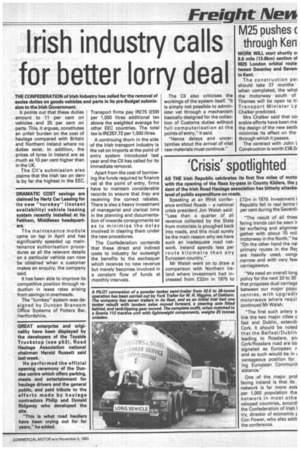Irish industry calls for better lorry deal
Page 17

If you've noticed an error in this article please click here to report it so we can fix it.
THE CONFEDERATION of Irish Industry has called for the removal of excise duties on goods vehicles and parts in its pre-Budget submission to the Irish Government.
It points out that these duties amount to 11 per cent on vehicles and 25 per cent on parts. This, it argues, constitutes an unfair burden on the cost of haulage compared with Britain and Northern Ireland where no duties exist. In addition, the prices of tyres in Ireland are as much as 10 per cent higher than in the UK.
The Cll's submission also claims that the Irish tax on dery is by far the highest in the EEC.
DRAMATIC COST savings are claimed by Hertz Car Leasing for its new "turnkey" (instant availability) vehicle leasing system recently installed at its Fe'them, Middlesex headquarters.
The maintenance module came on tap in April and has significantly speeded up maintenance authorisation procedures as all the relevant details on a particular vehicle can now be obtained when a customer makes an enquiry, the company said.
It has been able to improve its competitive position through reduction in lease rates arising from savings in overheads.
The "turnkey" system was designed by Duncan Bransom Office Systems of Potters Bar, Hertfordshire. Transport firms pay IRE75 (£59) per 1,000 litres additional tax above the weighted average for other EEC countries. The total tax is IRE257.72 per 1,000 litres.
A continuing thorn in the side of the Irish transport industry is the vat on imports at the point of entry system introduced last year and the CI' has called for its immediate removal.
Apart from the cost of borrowing the funds required to finance vat at the point of entry, firms have to maintain considerable records to ensure that they are receiving the correct rebates. There is also a heavy investment of managerial and clerical time in the planning and documentation of inwards consignments so as to minimise the delay involved in clearing them under the new procedures.
The Confederation contends that these direct and indirect costs to industry far outweigh the benefits to the exchequer which receives no new revenue but merely becomes involved in a constant flow of funds at monthly intervals. The CII also criticises the workings of the system itself. "It is simply not possible to administer vat through a mechanism basically designed for the collection of Customs duties without full computerisation at the points of entry," it said.
"Hence delays and uncertainties about the arrival of vital raw materials must continue."




















































































































